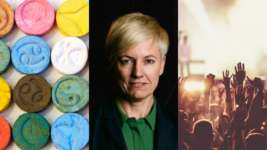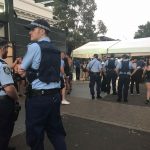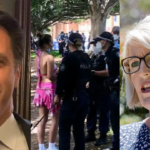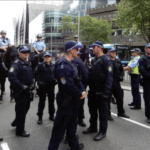The Right to Party in Peace: NSW Heavy-Handed Drug Law Enforcement Is Unjustified

The NSW Police Force has spent $46 million dollars over the last decade in order to run its drug detection dog unit. This expenditure has led police officers to conduct 95,000 searches of civilians over the last ten years, with only 25 percent of them turning up any illicit substances.
The 2006 Ombudsman report found that three-quarters of the time a sniffer dog indication did result in drugs being located, what was found was a small amount of cannabis, which can result in a caution at the discretion of attending officers in NSW, meaning no penalty is imposed.
NSW Greens MLC Cate Faehrmann obtained these figures. And the upper house member had entered the new term of parliament expecting a change in government approach to the issue of illicit substances, only to see NSW premier Chris Minns renege on his earlier promise to reform.
Faehrmann caused a stir in 2019, when she came out about having taken MDMA in the 1990s. And in fact, back in the 90s, there was a stark difference to the club and festival scene in that there were no drug dogs trawling events and nor were now common strip searches being employed.
So, today, rather than successive NSW governments having listened to the evidence-based reasoning of drug law reform experts, this state continues to deploy officers accompanied by drug dogs to festivals, in an effort to strip search and harass young people into just saying no to drugs to no avail.
Criminalising the public
“People are entitled to go out, listen to music and dance with their friends without having to be treated like they’ve done something wrong, or even worse, be subjected to degrading and traumatising treatment which the evidence shows doesn’t reduce harm,” said Faehrmann.
NSW only began the warrantless use of sniffer dogs in public just prior to the 2000 Sydney Olympics. However, in its wake, the state government decided to make the NSW police drug dog unit a permanent fixture. And this use has gradually increased over subsequent decades.
Critics began raising concerns about the proliferation of drug dogs a decade ago, as it was found that on two-thirds to three-quarters of occasions that dogs were indicating civilians, a subsequent search turned up no drugs. And further dogs were being disproportionately deployed to marginalised areas.
As the campaign against sniffer dog use picked up momentum it further became apparent that the police were increasingly following pat down searches that turned up no drugs with an invasive strip search. And by the end of the last decade, NSW police use of strip searches had become routine.
“When drug detection dogs were first introduced in NSW, it was under the guise of targeting supply,” Faehrmann told Sydney Criminal Lawyers. “Clearly, the whole scheme is now being used to harass and target people who are simply going out to a pub, a club or a music festival.”
Promoting hazardous behaviour
As the critical eye turned upon the NSW police drug dog operations a decade back, stories began emerging about festivalgoers partaking in dodgy drugtaking practices that could prove fatal in an effort to avoid the detection of the walls of blue bodies and dogs greeting people at such events.
These practices include preloading, which sees punters taking all of their drugs prior to arriving at an event. Another is panic overdose, which occurs when a person spots the police and then swallows all their drugs at once. The other key practice involves hiding packages of drugs in body cavities.
“In fact, not only do the increased presence and the use of sniffer dogs increase the likelihood of potentially more dangerous drugtaking behaviour, but we know that searches undertaken as a result of drug dog indications are wrong over 75 percent of the time,” said Faehrmann.
“This is not a harm reduction approach – it’s a degradation approach,” she maintained.
Claims that the police presence at events is promoting dangerous drugtaking behaviour amongst young people have been found genuine and supported by the findings of the NSW coronial inquiry into festival deaths, along with the report of the special inquiry into ice.
However, despite both these official inquiries recommending that drug dogs be ditched, their suggestions were ultimately ruled out straightaway by the Berejiklian government. And six months into its tenure, it seems unlikely that the Minns Labor government is moving to reform this situation.
It doesn’t have to be like this
The NSW government has been reluctant to consider any criticism of the drug dog program, or the use of strip searches, as when it comes to the NSW Police Force and its related union, both majors tend to bend over backwards to enhance their powers, rather than revoke them.
Indeed, a recent press release saw premier Minns pledging to consider a system of depenalisation, whereby a resident may be issued with up to two cautions for personal drug possession, prior to a third incident warranting arrest.
“NSW police will retain their discretion in all cases to charge a person and proceed to court – this adds another tool to their kit,” reads the statement. “It is still an offence to possess and use illicit drugs.” And this hints that law enforcement benefits procedurally from drugs being illegal.
The reverse side of this outcome involves the Minns government spruiking this scheme as an alternative to drug decriminalisation, which is what the Uniting Church NSW.ACT and 70-odd other civil society organisations, including the NSW Bar Association, have been calling for since 2018.
Faehrmann has outlined that Minns ran on a platform promising a drug summit and law reform. Yet, in early September, when Murdoch raised the point that the ACT was decriminalising drugs at the end of October, the premier ruled out such a move here and pushed back the timing of the summit.
“When the ice inquiry recommended that a drug diversionary scheme be implemented as a backup to full decriminalisation,” the Greens MLC continued, “the former government committed to introducing a two-strike diversionary scheme for personal quantities of drugs.”
Faehrmann also touched upon the issues of officers having the ability to exercise discretion when pressing cannabis charges. She explained that the ice inquiry specifically recommended removing discretion, as NSW cannabis cautioning discretion is resulting in gaping disparities.
Despite officers having this discretion to issue cautions for Canada rather than arrest, over the five years to 2017, police pursued 80 percent of First Nations people in possession of a cautionable amount through the courts, whilst only 50 percent of non-Indigenous people were served the same.
“I’m calling on the government to remove the ability for the police to exercise their discretion with this new scheme and also scrap drug dogs and overzealous policing at festivals and other places of entertainment and focus police resources where they’re actually needed,” she added.
Quality control
The premier’s backflip on drug reform has led to fallout amongst the harm reduction sector as the chance for change had appeared on the horizon as the Coalition was voted out of office for the first time in a decade. However, now it appears, the conservative line is being towed on both sides.
In response to the turnaround by the NSW Labor government, drug reform organisation Unharm launched a fresh campaign calling for the implementation of pill testing in NSW, in line with such an intervention in the ACT, where fixed site pill testing has been available since mid-last year.
Under the Labor-Greens government in the ACT, people can purchase an amount of the most popular illegal drugs for personal use, and this no longer leads to arrest. These individuals can then test their drugs to indicate whether any toxic substances are present within them.
However, the premier has, like his predecessors, completely ruled out the implementation of pill testing, and, just like clockwork, two young men died at a Sydney music festival in drug-related circumstances in mid-October.
“Pill testing and drug checking services around the world, and in fact here in the ACT, have shown that young people aren’t taking drugs irresponsibly,” Faehrmann continued, as she raised the fact that in many European countries, these lifesaving services have been available since the mid-90s.
But rather than follow the lead of the Europeans, NSW ministers have repeatedly stuck their heads in the sand when this subject arises, and they continue to implement tough on drug policies that lead to more casualties, as well as a hostile environment for all regardless of whether they partake.
“When they have the option to have their drugs tested and informed of what they’re taking, what the impacts might be, and whether it will have a dangerous effect, some choose not to take the drug or consider taking it in a safer way than they may have intended,” the Greens MLC explained.
“This is the opposite effect that law enforcement has had which typically results in people consuming their drugs quickly and unsafely to avoid detection,” she ended.







